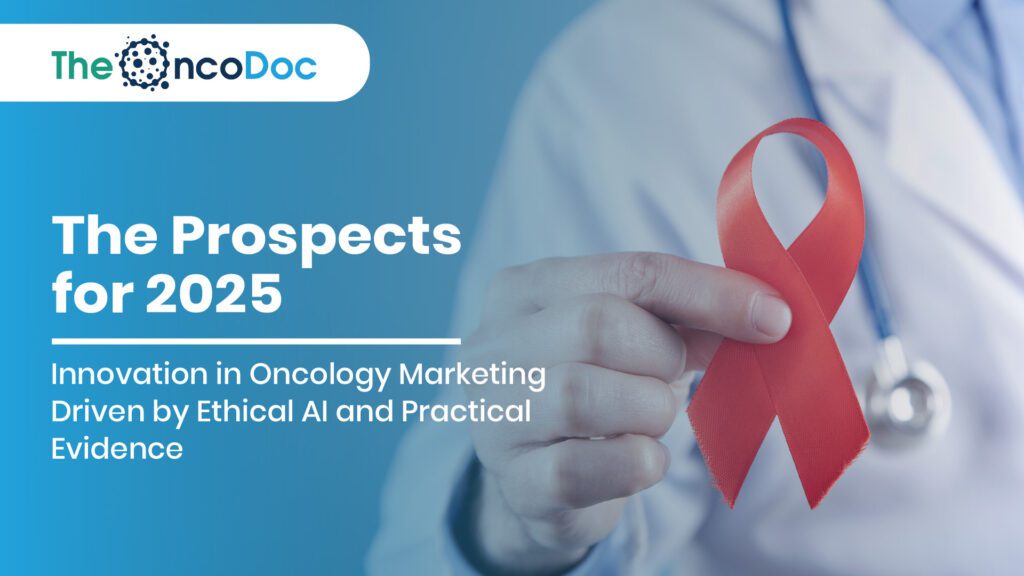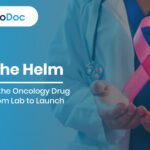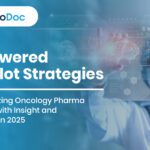Introduction: Redefining Trust and Evidence in Cancer Care
Oncology pharma marketing is evolving into a sophisticated ecosystem that prioritizes transparency, patient trust, and measurable impact over traditional promotional messaging. In 2025, the convergence of ethical artificial intelligence (AI) and real-world evidence (RWE) has set a new benchmark for innovation. Marketing strategies are no longer judged solely on engagement rates but on their ability to empower patients, influence clinical decisions, and support better treatment outcomes.
The stakes are higher than ever. Cancer care is deeply personal, emotionally charged, and data-intensive. Pharma marketers are navigating this complexity with the use of plausible storylines based on RWE, explainable algorithms, and AI-powered customisation. This next-generation marketing approach aims to earn trust, deliver precision, and influence behavior ethically while aligning with evolving regulatory standards.
This article explores how ethical AI and RWE are transforming oncology pharma marketing in 2025, breaking down strategies, case studies, and actionable insights point by point.
1. The Emergence of the AI Ethics Score
The concept of the AI Ethics Score has moved from a theoretical framework to a measurable standard. It evaluates pharma companies on their ability to maintain bias-free algorithms, transparency, and human oversight.
- The score acts as a credibility badge that companies can showcase in campaigns, signaling their commitment to safe and equitable patient engagement.
- Campaigns featuring their Ethics Score demonstrate transparency and resonate with patients and providers.

2. Data Provenance as a Marketing Differentiator
In 2025, patients and clinicians are asking where the data comes from. Pharma companies now highlight data provenance as a marketing differentiator:
- More than 50,000 anonymized and demographically representative patient records are used to train AI systems.
- Transparency messaging like “Our AI-driven support app is trained on ethically sourced data” builds confidence in both patients and providers.
- Regulatory audits reward brands that proactively disclose training data sources.
3. Explainable AI (XAI) for Oncologist Trust
Trusting AI recommendations is vital in oncology. XAI tools ensure every recommendation is backed by a traceable decision path:
- Oncologists can view why a treatment or diagnostic pathway was suggested.
- Patient-facing explanations simplify medical jargon, reducing anxiety and resistance to AI-powered tools.
- Campaigns highlight “AI as a partner, not a replacement,” reinforcing confidence.
4. Human Oversight in AI Marketing
AI systems are no longer standalone; they operate under human review boards and ethics councils:
- Before being released, every AI-generated campaign content is verified by humans.
- Pharma companies display transparency statements like: “Reviewed by AI Ethics Council” in campaigns, turning scrutiny into a trust-building opportunity.
5. Marketing AI Transparency as a Value Proposition
The “AI Ethics Score” has become a marketing tool itself:
- Companies incorporate trust statements directly into consumer-facing campaigns.
- Ads communicate anonymity, traceability, and security of patient data, reducing skepticism.
- This proactive approach shifts perception from fear of AI to confidence in innovation.
6. The RWE Revolution in Oncology Marketing
Real-World Evidence (RWE) is transforming how oncology drugs are marketed:
- RWE is currently accepted by regulatory bodies such as the FDA and EMA to augment trial data, providing brands with a more compelling story.
- Campaigns now highlight patient outcomes, quality of life, and reduced hospitalization rates alongside survival metrics.
7. Beyond RCTs: Storytelling with Real-Life Data
RCTs are crucial but limited to narrow demographics. RWE bridges the gap:
- Campaigns emphasize treatment performance in real-world environments, demonstrating credibility to both patients and payers.
- Real-world metrics like workforce reintegration, caregiver burden reduction, and emotional well-being enhance messaging depth.

8. Marketing Evidence to Payers and Providers
Marketing materials are now cost-effectiveness narratives, not just efficacy claims:
- RWE from insurance claims proves drugs reduce follow-up care costs.
- Payers value evidence showing improved adherence and minimized side effects, enhancing reimbursement decisions.
9. Personalized Campaigns with Ethical AI
AI’s personalization capabilities are now tempered by ethical frameworks:
- Ads and educational content are hyper-targeted but privacy-first.
- Patient demographics, behavioral insights, and regional data power tailored narratives without breaching confidentiality.
10. Ethical Storytelling in Oncology Pharma
Marketing is shifting from product-centric to evidence-driven patient narratives:
- Campaigns highlight emotional journeys backed by verifiable statistics.
- Survivor stories, when paired with real-world treatment outcomes, amplify credibility.
11. Leveraging Wearables for Real-Time RWE
Wearables are central to data-driven storytelling:
- Continuous monitoring of vitals and lifestyle factors enhances datasets.
- Campaigns now display aggregate patient-reported quality-of-life metrics, reinforcing a drug’s holistic benefits.
12. From “Promotional” to “Evidence-Based” Narratives
Oncology marketing is evolving:
- Instead of “Drug X is effective,” campaigns say:
“National registry data shows a 30% reduction in adverse events in Year 1.”
- Physician trust is increased more quickly by this evidence-based strategy than by catchphrases.
13. AI-Ethics Integration in Regulatory Compliance
The AI Ethics Score is helping brands align with global AI legislation:
- European regulators are mandating AI explainability in healthcare.
- Pharma companies are leveraging compliance as a brand differentiator.
14. RWE Campaign Examples in Action
- Oral Chemotherapy Marketing: App-gathered adherence data shows better nausea control, which humanizes ads.
- Cardiac Oncology Drug Launch: Wearable monitoring data demonstrates better heart health post-treatment.

15. Building Trust Through Data Transparency
Patients expect brands to democratize data:
- Campaigns now include links to anonymized study datasets.
- Transparency becomes part of marketing storytelling, not just compliance.
16. AI-Powered Content Explainability for Patients
AI-powered marketing is revolutionizing patient education by simplifying and facilitating access to complicated medical information:
- Campaigns now use AI to create personalized educational content, tailoring information to individual patient profiles, health history, and preferences.
- AI-powered chatbots simplify treatment options, explain potential side effects, and guide patients through care steps in easy-to-understand language.
- This improves confidence in therapy decisions and strengthens adherence, as patients feel informed and supported.
- Visual aids, interactive tools, and multilingual features further enhance understanding for diverse audiences.
- By focusing on explainability, pharma brands shift from generic messaging to trust-building, patient-centric communication strategies.
17. Localized Campaigns Backed by Ethical AI
AI personalization now factors in local culture and literacy levels:
- Regional campaigns deliver content in native languages using AI-driven tone adjustments.
- Example: Rural campaigns focus on community-led narratives, urban ones on digital self-care tools.
18. Gamification and Engagement with Evidence
Gamification is now a powerful strategy in oncology campaigns, making health engagement interactive and data-driven:
- Patients earn points or rewards for completing screenings, logging treatment adherence, and attending follow-up appointments, motivating consistent participation.
- Campaigns highlight evidence-backed outcomes, such as reduced hospital visits or improved therapy response rates, to keep engagement purposeful and credible.
- Gamified leaderboards, badges, and community challenges encourage competition while promoting early detection and healthy habits.
- This approach shifts cancer awareness campaigns from passive education to active participation, fostering stronger behavioral change.
- Evidence-led gamification adds value by connecting fun, motivation, and real-world health impact seamlessly.
19. Measuring Campaign Success with Health-First KPIs
Traditional ad metrics are obsolete. 2025 KPIs include:
- Screening uptake rates.
- Percentage of patients using adherence apps.
- Emotional sentiment analysis of campaigns.

20. Sentiment Analysis to Drive Patient-Centric Messaging
AI-powered sentiment analysis tools are becoming essential in oncology pharma marketing, offering marketers real-time insights into how patients and caregivers emotionally respond to campaigns. These tools analyze social media comments, chatbot conversations, feedback forms, and online discussions, identifying emotional triggers such as fear, anxiety, hope, or trust. If a campaign unintentionally creates fear, marketers can quickly recalibrate its messaging to be more empathetic and reassuring. Similarly, highly positive or inspiring content is amplified for wider outreach. This approach ensures marketing remains emotionally intelligent and culturally sensitive, which is vital in oncology, where treatment decisions are deeply personal. Brands now incorporate emotional data into creative strategies, making campaigns supportive and informative rather than purely promotional. The integration of sentiment insights helps pharma marketers humanize their content and engage with audiences on a deeper level, driving stronger relationships with patients, caregivers, and healthcare providers while ensuring messaging aligns with patient well-being goals.
21. AI-Ethics Councils as Brand Guardians
AI-Ethics Councils are emerging as powerful safeguards for ethical oncology marketing:
- These multidisciplinary boards, comprising ethicists, oncologists, data scientists, and patient advocates, thoroughly review campaign content before launch.
- Their role is to ensure fairness, inclusivity, and regulatory alignment while safeguarding patient dignity and trust.
- Campaigns are evaluated for potential bias, misinformation, or emotional harm, ensuring marketing stays patient-centered.
- Publicly disclosing council involvement adds transparency and credibility, positioning pharma brands as responsible healthcare leaders.
- These councils transform AI-driven marketing from a purely technical process into an ethically guided strategy, reinforcing trust in sensitive oncology communications.
22. Ethical AI in HCP-Focused Campaigns
Ethical AI is transforming how pharma brands engage healthcare professionals (HCPs):
- HCPs now demand data-driven decision support tools that enhance clinical decision-making rather than just promote products.
- AI-powered apps with explainable AI (XAI) provide clear, traceable logic behind treatment recommendations, improving transparency.
- When clinicians understand AI’s reasoning, trust in pharma content grows significantly.
- Ethical safeguards ensure recommendations are evidence-based, unbiased, and aligned with clinical guidelines.
- These campaigns position pharma brands as knowledge partners, offering credible, practical resources rather than marketing-heavy content, strengthening long-term relationships with oncologists and ensuring marketing adds real value to patient care.
23. Post-Treatment RWE Campaigns
Post-treatment RWE-driven campaigns are becoming essential for showcasing a drug’s long-term value beyond initial therapy:
- These campaigns highlight survivorship journeys, emphasizing recovery milestones, quality of life improvements, and emotional well-being.
- Real-world data collected from patient registries, wearable devices, and support platforms demonstrates measurable outcomes, such as fewer hospital readmissions, improved side-effect management, and better mental health scores.
- By presenting authentic, data-backed success stories, pharma brands reinforce their role as partners in a patient’s entire cancer journey, not just medication providers.
- Campaigns also educate survivors on follow-up care, nutrition, emotional resilience, and long-term monitoring, fostering trust and loyalty.
- This shift in focus from sales-driven messaging to holistic patient care demonstrates a commitment to improving survivorship experiences, positioning brands as leaders in ethical, evidence-based marketing.
- Post-treatment RWE campaigns thus bridge the gap between treatment completion and life after cancer, creating lasting brand-patient connections.
24. From Awareness to Empowerment
Oncology pharma marketing is shifting from simple awareness to patient empowerment:
- Campaigns now focus on providing patients with actionable tools, personalized education, and confidence to actively participate in their care.
- AI-powered mental health monitoring offers emotional support, while real-world evidence (RWE) campaigns demonstrate success stories to inspire hope and trust.
- Patients are encouraged to take charge of screening, treatment adherence, and lifestyle changes through tailored digital platforms.
- This approach promotes autonomy over dependency, positioning brands as supportive partners rather than information providers.
- Empowerment-driven campaigns create stronger emotional connections, improving outcomes and patient loyalty.
25. Future Outlook: Ethics as the Core of Oncology Marketing
The intersection of AI and RWE is shaping a trust-first marketing future:
- AI transparency frameworks will soon be mandatory, making Ethics Scores industry standards.
- RWE will become the primary marketing narrative, replacing generic messaging.
- Brands that embrace evidence-first and human-centered innovation will define oncology marketing’s next decade.
Conclusion
In 2025, oncology pharma marketing has entered a new era of accountability, precision, and patient-first innovation. The adoption of AI Ethics Scores and RWE-driven campaigns is dismantling skepticism, fostering trust, and transforming brands into credible partners in cancer care. By integrating transparency into messaging, leveraging data ethically, and prioritizing emotional engagement, pharma companies are not just marketing drugs, they are shaping a future where patients are informed, empowered, and supported every step of their journey.
The Oncodoc team is a group of passionate healthcare and marketing professionals dedicated to delivering accurate, engaging, and impactful content. With expertise across medical research, digital strategy, and clinical communication, the team focuses on empowering healthcare professionals and patients alike. Through evidence-based insights and innovative storytelling, Hidoc aims to bridge the gap between medicine and digital engagement, promoting wellness and informed decision-making.



